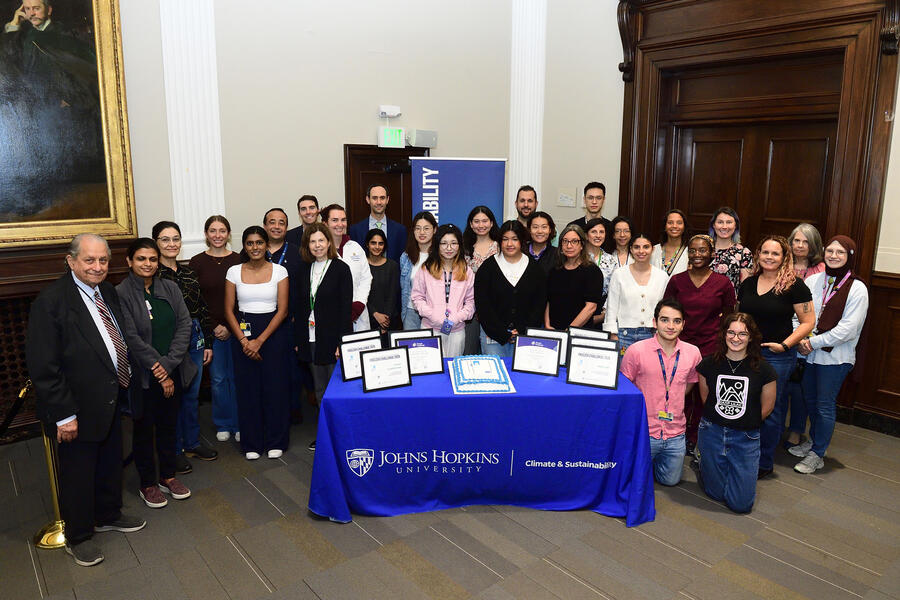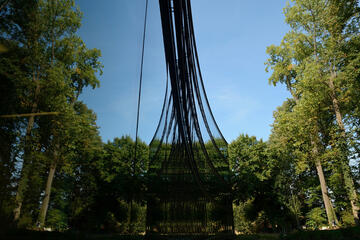For its efforts to save 1,560 kWh/day in energy costs in its research laboratories, Johns Hopkins University was named the top-performing academic institution among more than 110 peers in the 2025 International Freezer Challenge, an annual award promoting best practices in cold storage management.
Two Hopkins labs also earned individual honors:
- The GI Oncology/Elizabeth Jaffee Lab at the School of Medicine, led by James Leatherman, received the large lab winning streak award for saving 171 kWh/day.
- The medium lab award went to the Quinn/Tobian Lab at the Bloomberg School of Public Health, which saved 168 kWh/day. The lab is by Kiersten Wienclawski.
In addition to the international accolades, Johns Hopkins Facilities and Real Estate and Johns Hopkins Hospital Facilities offered awards of $3,000 to two top-performing large and small labs at the Homewood campus and the School of Medicine:
- Top Performing Large Lab Award, School of Medicine: The GI Oncology/Elizabeth Jaffee Lab
- Top Performing Small Lab Award, School of Medicine: The Meaghan Morris Lab in the Pathology Department, led by Haidan Guo
- Top Performing Large Lab Award, Homewood campus: The Jeff Wang BioMEMS Lab, led by Amelia Traylor
- Top Performing Small Lab Award, Homewood campus: The Honggang Cui Lab in the Department of Chemical and Biomolecular Engineering at WSE, led by Myriel Kim
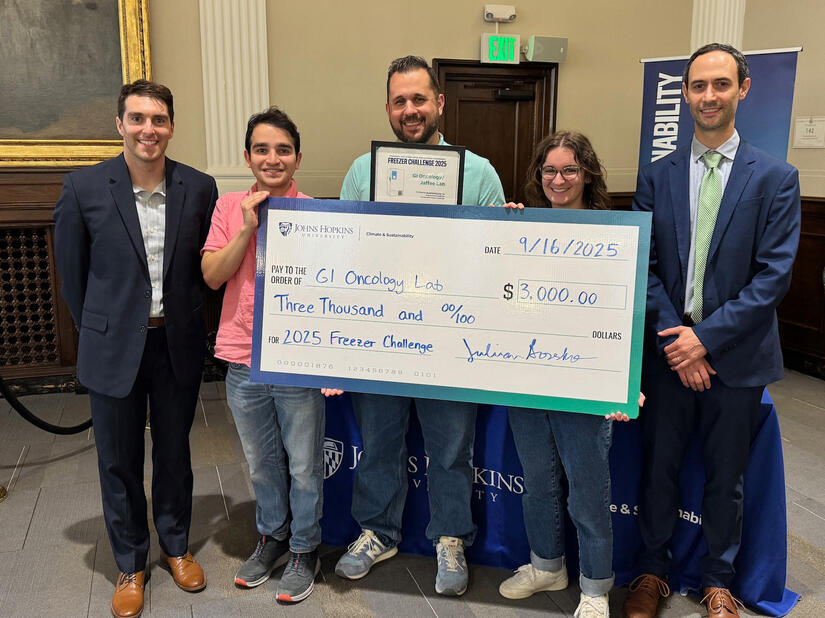
Image caption: The GI Oncology/Elizabeth Jaffee Lab team
Image credit: Office of Sustainability
The winning labs—as well as a number of individual lab managers—were recently recognized for their efforts at the inaugural Freezer Challenge Awards Luncheon hosted by the Johns Hopkins Office of Climate and Sustainability.
Research labs make up a significant portion of JHU's physical footprint and use four to five times more energy and water than a typical office building, in part due to the high energy consumption of ultra-low temperature freezers. Labs can reduce energy consumption by regularly defrosting freezers, organizing inventories, cleaning out unused or outdated samples, adjusting temperatures to -70°C, repairing broken freezers, upgrading to more energy-efficient equipment, and installing monitoring systems, among other energy-reducing tactics.
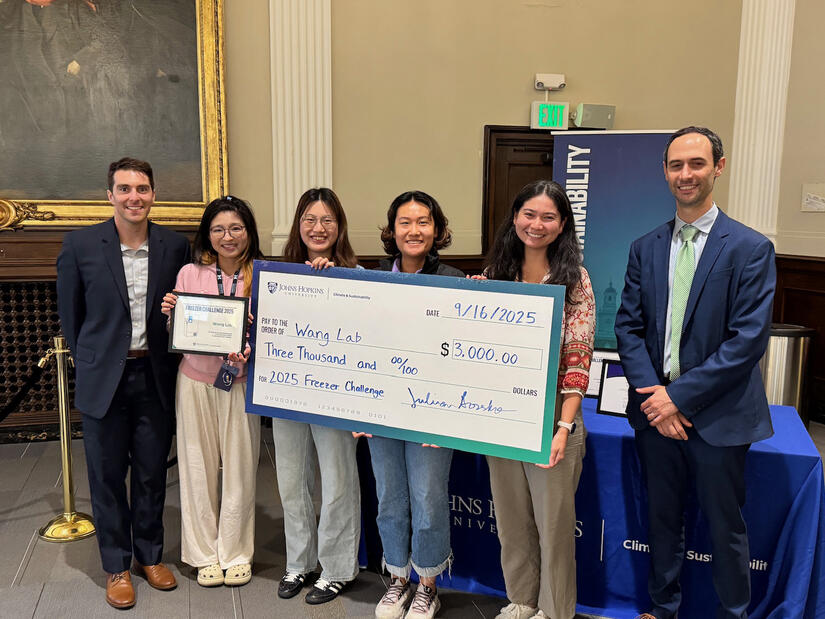
Image caption: The Jeff Wang BioMEMS Lab team
Image credit: Office of Sustainability
"The Freezer Challenge provides accountability for practices we should have been maintaining all along," says Amelia Traylor, PhD candidate in the Jeff Wang BioMEMS Lab in the Department of Mechanical Engineering at the Whiting School of Engineering. "This year, we cleared out samples that had been sitting unused for almost a decade, consuming energy without purpose. Sustainability begins with small, individual actions that are easy to forget or overlook in group settings but make a meaningful impact when prioritized. The Freezer Challenge is a great reminder of that."
The annual International Freezer Challenge aims to unite the scientific community around a shared goal: reducing the environmental impact of research through smarter, more sustainable cold storage practices. The challenge is a simple but impactful way to support sustainability in research, says Sandra Albornoz, research associate in the TracE Analytical Metals Lab, Department of Environmental Health and Engineering at the Bloomberg School. This year, Johns Hopkins had 51 entries representing 79 labs across the university, collectively reducing energy consumption by an estimated 1,560 kWh/day. This is approximately the energy usage of more than 50 single-family homes per day.

Image caption: The Meaghan Morris Lab team
Image credit: Office of Sustainability
The Freezer Challenge also offers "a fun way to get buy-in from the rest of the lab to do the very un-fun task of cleaning and reorganizing," says Suzanne Queen, laboratory manager for the Retrovirus Laboratory in the Department of Molecular and Comparative Pathobiology at the School of Medicine.
"Aside from the power savings, I think it gives awareness of how to care and use equipment properly," says Leatherman, research associate and lab manager in the GI Oncology Lab at the School of Medicine.
The annual Freezer Challenge is part of the Office of Climate and Sustainability's Green Labs program, established in 2022 to address the environmental impact of JHU's thousands of research and teaching labs. The university's Climate Action and Sustainability Plan, adopted in October 2024, includes commitments to reduce emissions and increase responsible procurement, which are particularly important within lab spaces.
"When research and sustainability work in harmony, laboratories become not just hubs of discovery, but beacons of responsible innovation," says Julian Goresko, director of the Office of Climate and Sustainability.
Hopkins lab teams "want to be good environmental stewards by reducing our carbon footprint, and in doing so we save energy and resources," which is one of the benefits of the Freezer Challenge, says Ana Maria Rule, director of the Environmental Exposure Assessment Labs, Department of Environmental Health and Engineering at the Bloomberg School. Labs also work to reduce their environmental impacts in other ways, such as reusing materials and tools when possible, sharing resources, opting for more sustainable supplies, placing bulk orders, and participating in specialty recycling programs for items like pipette tip boxes.
The Green Labs program manages several other initiatives to improve the sustainability of labs across the university. To receive Green Labs updates, including information about next year's challenge, upcoming events, and other ways to improve lab sustainability, researchers at all levels are encouraged to sign up for the Green Labs newsletter.
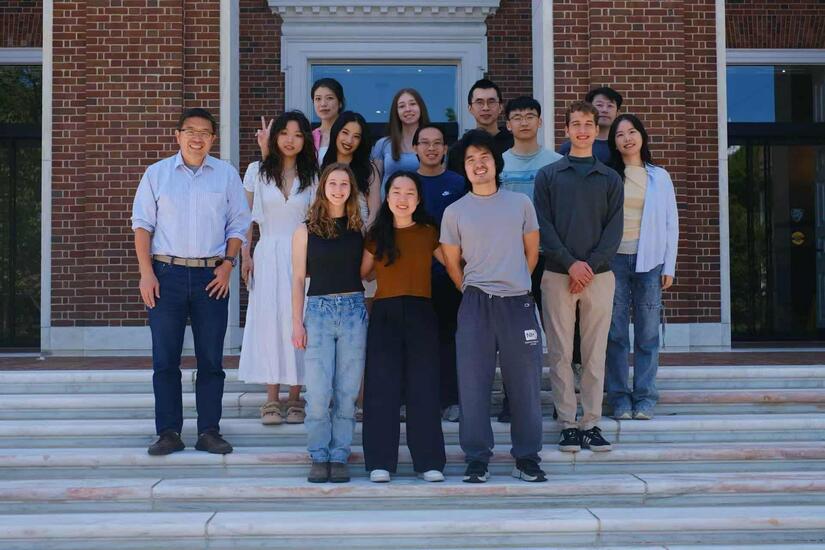
Image caption: The Honggang Cui Lab team
Image credit: Courtesy of the Honggang Cui Lab
Posted in University News, At Work




